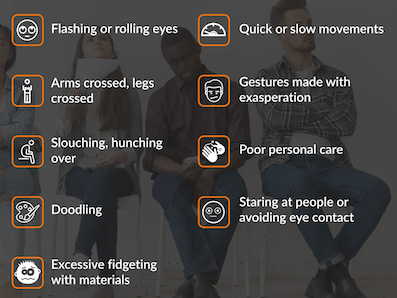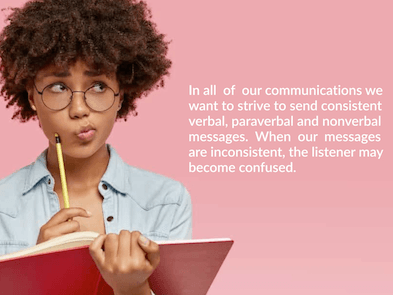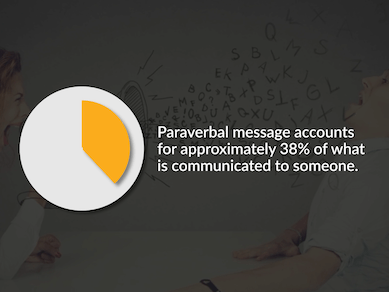Communication Skills Course
This online Communication Skills course helps learner build the foundation upon which successful careers are built – the ability to communicate effectively.
Good communication is essential for every business. Whether it’s a face-to-face conversation or a professionally written email exchange. If you and your colleagues are able to communicate well your team or workplace will be more successful.
Effective communicators can control both what they say and how they say it because they understand the different types of communication. This enables them to deliver messages with impact and clarity and helps create an atmosphere conducive to great business!
Course Content
UNIT 1 | SENDING MESSAGES
We begin by defining the types of communication. Namely, Verbal, Nonverbal and Paraverbal. After this, we outline the importance of consistency across these types.
UNIT 2 | RECEIVING MESSAGES
Secondly, we explore listening skills. Importantly, great communicators must pay attention to both the words and feelings of their audience.
UNIT 3 | BARRIERS TO EFFECTIVE COMMUNICATION
Lastly, this course highlights barriers to effective communication, such as frustration. And, nonverbal barriers such as inappropriate appearance.
Communication Skills Certificate


At the end of this Communication Skills training online there is a 15 question, multiple-choice quiz. If learners demonstrate their understanding of course content by achieving a minimum score of 80%, we’ll email them their completion certificate. If learners score less than 80%, they can revisit any part of the course and retake the quiz until they are successful. A posted certificate is available for £9.
Course Preview
Echo3 courses include engaging motion-graphic video content, with full english subtitles
Reviews
What are the communication skills course learning objective?
On completion of this online Communication Skills training you will know;
- Why communication is so important
- The meaning of verbal, nonverbal, and paraverbal
- Importance of communication
- How to send clear messages
- How to full listen and understand messages
Who is the communication skills course for?
Everyone who must communicate with colleagues, customers, various stakeholders or the public will benefit from this short online communication skills course.
What is good verbal communication?
Verbal communication refers to the words we choose.
Our choice of words has tremendous power in the type of atmosphere that is created in the workplace.
Words that are critical, blaming, judgmental or accusatory tend to create a resistant and defensive mindset that is not conducive to constructive problem solving. On the other hand, we can choose words that normalise the issues and problems and reduce resistance. Phrases such as, ‘it is not uncommon for… ‘ or ‘for some people in similar situations’ are examples of this.
Sending effective messages also requires that we state our point of view as briefly and succinctly as possible.
Listening to a rambling, disorganised speaker is tedious and discouraging – why continue to listen when there is no interchange? Lengthy dissertations and circuitous explanations are confusing to the listener and the message loses its relevance, and impact.
What are non-verbal messages?
Nonverbal communication refers to body language. Such as our posture, gestures, facial expression and spatial distance. Through our body language we are always communicating, whether we intent to or not!
Nonverbal messages are the primary way that we communicate emotions, for example;
- Facial Expressions: The face is perhaps the most important conveyor of emotional information. A face can light up with enthusiasm, energy, and approval, express confusion or boredom, and scowl with displeasure.
- Eyes: The eyes are particularly expressive in telegraphing joy, sadness, anger, or confusion.
- Postures and Gestures: Our body postures can create a feeling of warm openness or cold rejection. For example, when someone faces us, sitting quietly with hands loosely folded in the lap, a feeling of anticipation and interest is created.
It is estimated that around 55% of what is perceived and understood by others is communicated by our nonverbal messages.
Why are listening skills important?
This online communication skills training highlights the importance of listening When we listen we gain information that is valuable for understanding our colleagues perceptions and resolving problems.
When we have a deeper understanding of our colleague’s perceptions, whether we agree with it or not, we hold the key to understanding that person’s motivation, attitude, and behaviour.
The understanding derived through listening enables managers to make better decisions.
So why don’t we all listen more? Because listening can be difficult and often, we subconsciously worry that if we listen attentively to someone we disagree with, we are inadvertently sending a message of agreement.
Effective listening requires;
- A desire to understand another human being, an attitude of respect and acceptance, and a willingness to open one’s mind to try and see things from another’s point of view.
- A high level of concentration and energy.
- Setting aside our own thoughts and agendas, putting ourselves in another’s shoes and making an effort to see the world through that person’s eyes.
- Suspending our judgment, evaluation, and approval in an attempt to understand another’s is frame of reference, emotions, and attitudes.












